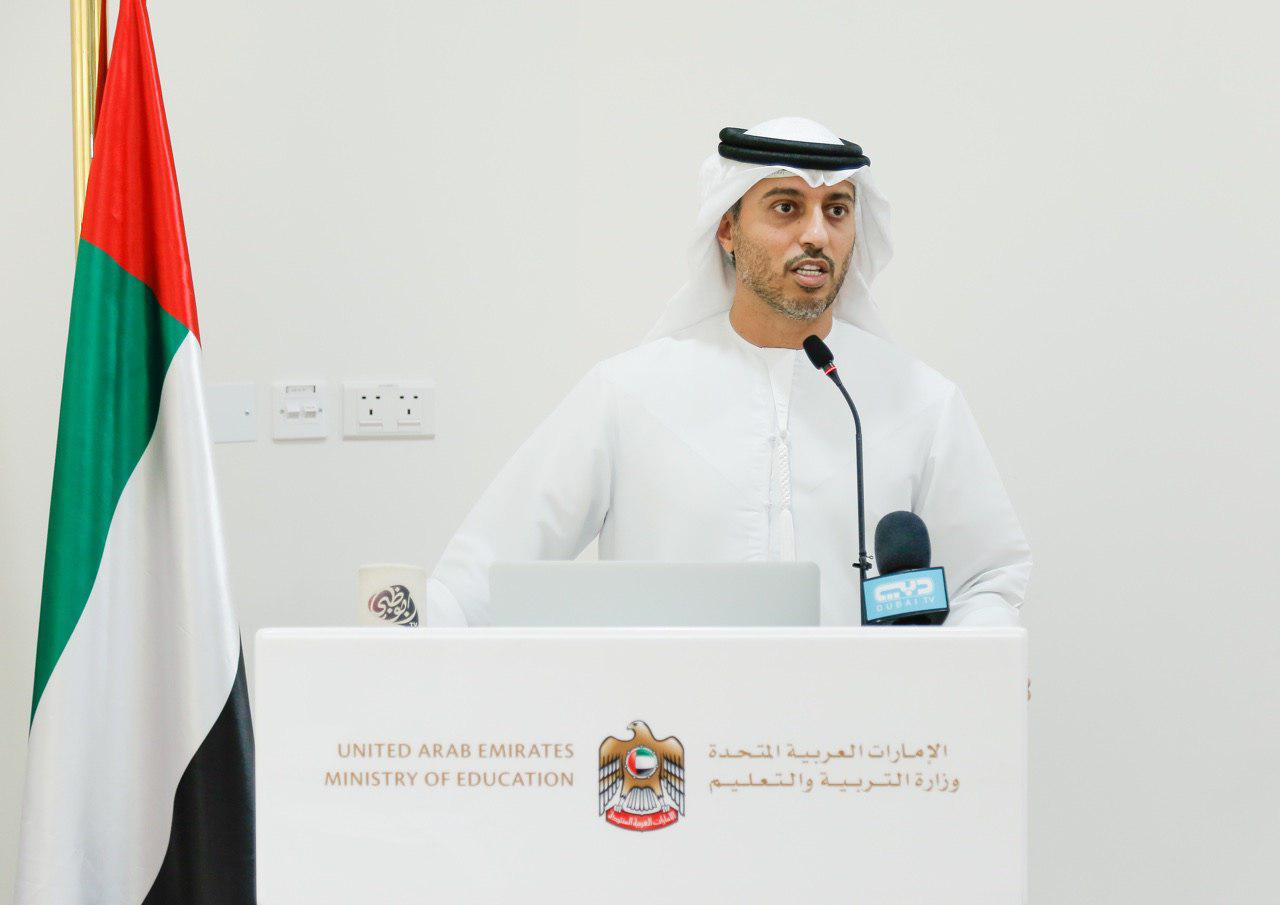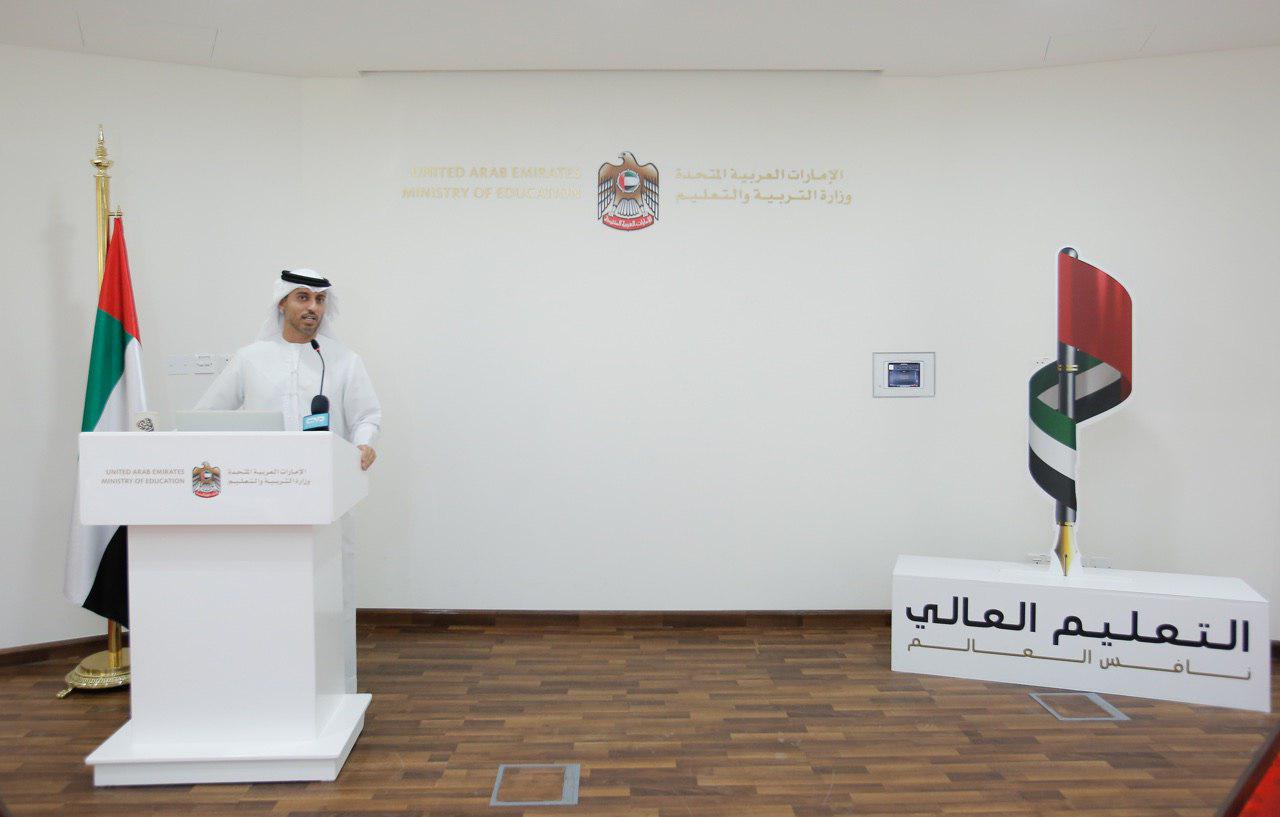• Building a generation of Emirati youth to uphold the UAE's future goals and competitiveness
• Access to quality higher education, both academically and in vocational learning
• Bolstering national scientific research and innovation systems
Dubai, UAE – 13 December 2017: The Ministry of Education announced the launch of the National Higher Education Strategy, following this week's UAE Cabinet meeting. The strategy was presented during a media briefing held today at the Ministry's headquarters in Dubai.
His Excellency Dr. Ahmad Belhoul Al Falasi, Minister of State for Higher Education and Advanced Skills, unveiled the strategy's ambitions for achieving quality higher education, both professionally and academically, leading to more impactful institutional research results. These objectives will support the development of a knowledge-based economy, for a generation which pioneers the future success of the country. Moreover, the strategy is set to equip future generations with the most advanced scientific, ethical and professional tools to instill life-long learning and sustain successful futures – in alignment with global competitiveness standards.

The launch of the strategy represents the Ministry of Education's ongoing efforts for implementing education systems with an integrated framework, following the recent launch of the Emirati School Model. The model unifies educational frameworks and curriculums on a national level, benchmarking them against global best practices. The model also seeks to create an enabling environment for students which promotes innovation and creativity.
His Excellency Hussain Ibrahim Al Hammadi, Cabinet Member and Minister of Education, affirmed that the fundamental changes to the education system, represent the Ministry's alignment with the country's future vision and plans, and are overseen by the nation's wise leadership. The educational developments target the building of Emirati students' talents in both higher and general education, and will be exercised in a comprehensive and effective approach. His Excellency Hussain Ibrahim Al Hammadi further asserted that the transitions will deliver a modern, global, educational model to Emirati students, who form the focal point of national investments and the country's biggest assets.
The National Higher Education Strategy is tied to the Ministry's vision for general education, and responds to the challenges identified by employing the latest educational best practices, said His Excellency Hussain Ibrahim Al Hammadi. His Excellency Hussain Ibrahim Al Hammadi added, that the National Higher Education Strategy will be consistent with strategies designed for general education, and will boost overall national education standards, ultimately affecting educational systems and career opportunities – by preparing students with the knowledge and skill-sets, enabling them to become talented, highly educated and knowledgeable individuals who meet the needs of the job market.
OVERVIEW: INTEGRATED STRATEGY FOR HIGHER EDUCATION
His Excellency Dr. Ahmad Belhoul Al Falasi stated, "Since our country's founding, the UAE has sought to invest in human capital by focusing on education. As a result, we now have a sophisticated educational framework, aligned with global competitiveness standards. To empower our students, we aim to support their skills and abilities, throughout the entire educational journey, to pave the way for life-long learning and help them adapt to the changing dynamics of the job market".
His Excellency Dr. Ahmad Belhoul Al Falasi added, "The strategy is made up of four pillars - Quality, Relevance, Innovation, and Efficiency. Together, the pillars will help build a generation that is productive, and, equipped with the knowledge and skill set to contribute to the development of a knowledge-based economy. Furthermore, the four pillars will enable future generations to excel in both the public and private sectors, through the promotion of research and entrepreneurship. This is reflective of our national identity, and vision for a tolerant and ethical society. "

FOUR PILLARS GUIDING THE IMPLEMENTATION OF THE STRATEGY
Quality represents efforts to provide students with a high-quality education in world-class and globally competitive institutions. The main objective of this pillar is to provide strong incentives for quality in all institutions (academic, applied and research), including through funding and transparent reporting. The Classification initiative was established to create a system for classifying educational institutions. Furthermore, the initiative will empower institutions to drive quality by strengthening the network of more specialized higher education institutions. In addition, the pillar will lead to strengthening of the faculty talent pipeline, including both high-potential national faculty and the highest-caliber international academics.
The strategy's second pillar, Relevance, promotes the creation of a student-centric system that produces more employable graduates by broadening the academic and vocational pathways relevant to labor market needs. Under the establishment of the Higher Education and Private Sector Council, potential employers will engage in program design, delivery and training to raise the capabilities and employability of graduates. The goals of the pillar will be fulfilled through the strengthening of links to the job market by fostering collaboration among educational institutions and the private sector to improve practical curricula and develop more useful internship programs. Moreover, this pillar will focus on efforts to provide more holistic student journeys that align academic pursuits with research and development.
Under the pillar, Innovation, research, and innovation will flourish with higher education institutions forming the backbone of a thriving research ecosystem. To achieve this objective, the Ministry will build a more impactful innovation ecosystem that links research more closely to private sector needs, and direct government and private funding to the most promising areas through competitive mechanisms. These initiatives will help realize the national vision for a knowledge-based economy, increase the number of Ph.D. graduates by the threefold, demonstrating how the pursuit of postgraduate degrees are linked to sustainable career paths, and overall, opening a platform for graduates to choose academic careers and encouraging further learning.
Lastly, Efficiency addresses the optimization of impacts on students and the output of knowledge by the country as a whole. Moreover, the higher education system will operate efficiently without compromising quality nor students' experiences. To implement this, analytical studies will be conducted using machine-learning capabilities to analyze historical and current student records, and perform predictive analysis to derive the predictors of success and degree completion, versus failure or dropout rates in higher education institutions. In addition, high school performance, socioeconomic background, gender, geography, and surveys on key attitudes, will also be analyzed to determine success indicators of students. The results of these studies will be used by student support services at universities to identify students at risk of slow progression and provide the appropriate academic or social counseling, or other support services.
A PHASED APPROACH TO REALIZING THE GOALS OF THE STRATEGY
His Excellency Dr. Ahmad Belhoul Al Falasi closed the briefing by concluding, "The Higher Education strategy will be achieved and implemented over several phases – with an initial ramp up in the short-term. We want to align with our partners and increase collaborations with the private sector. In the long-run, we will drive economic development with a focus on strengthening university programs, and align specializations and research studies with the demands of the job market."
14/12/2017